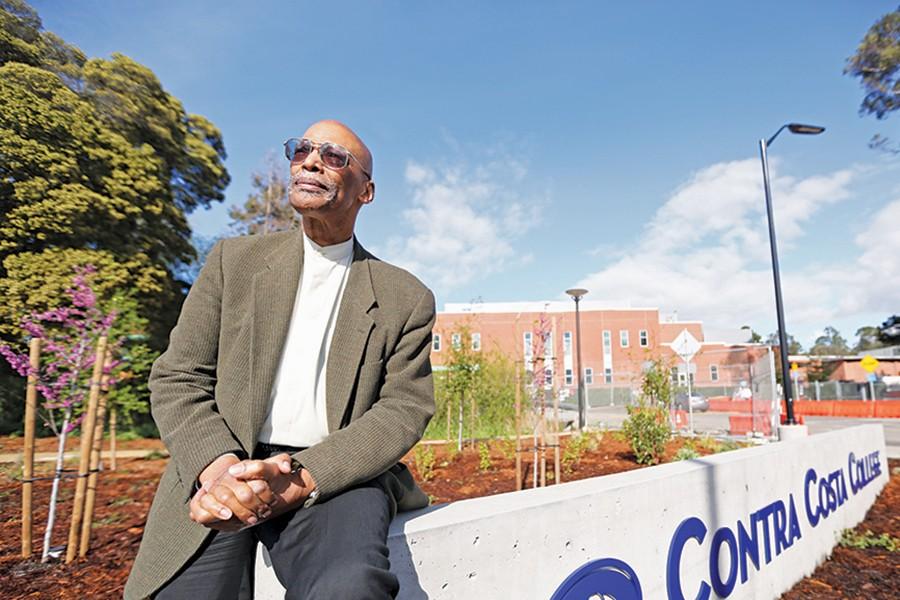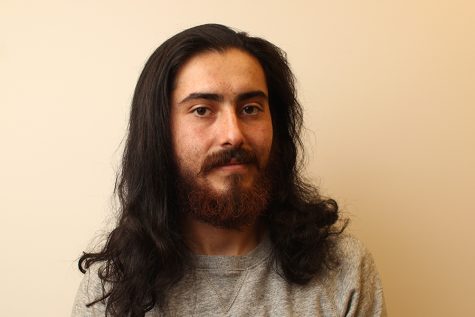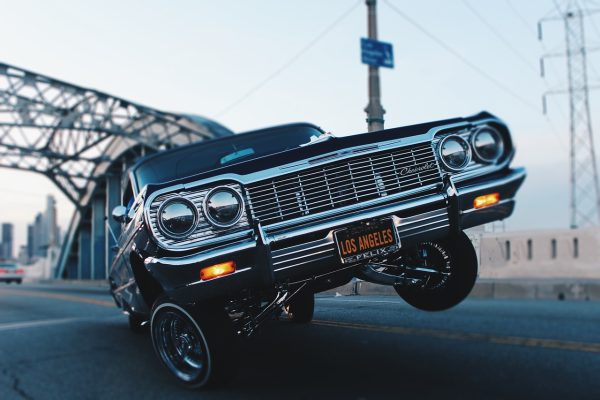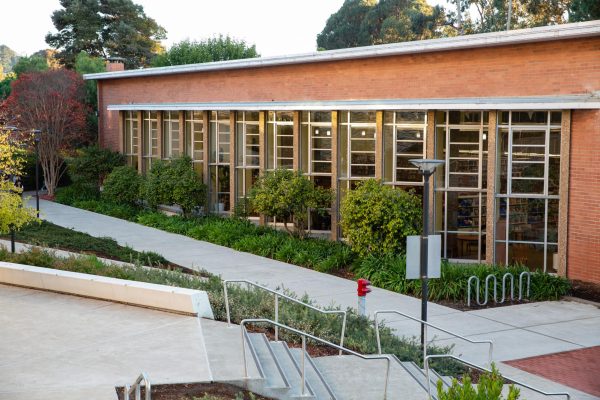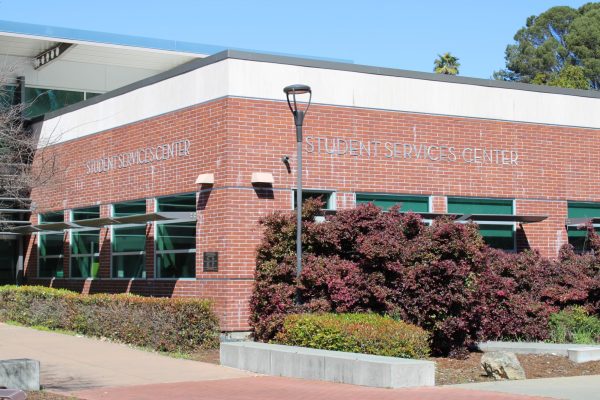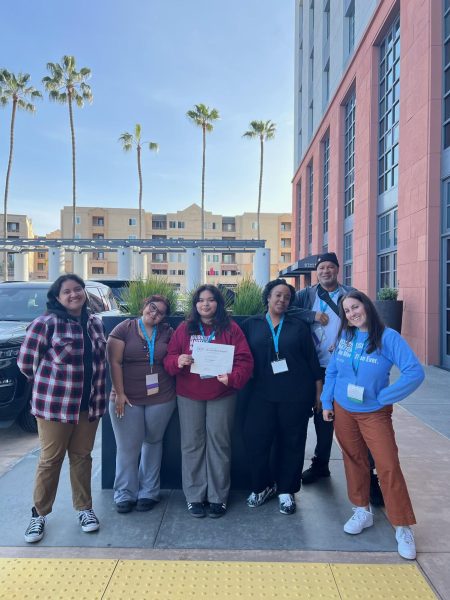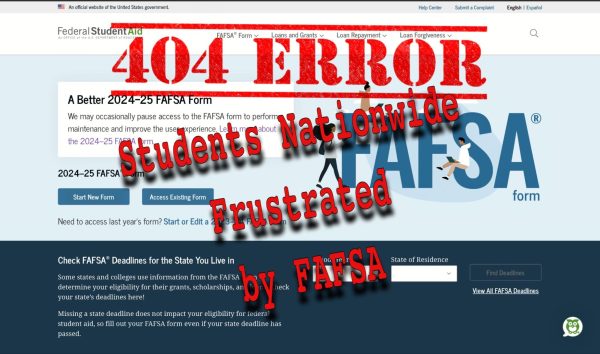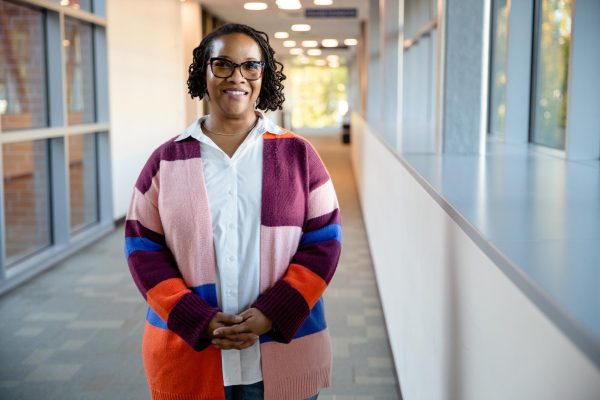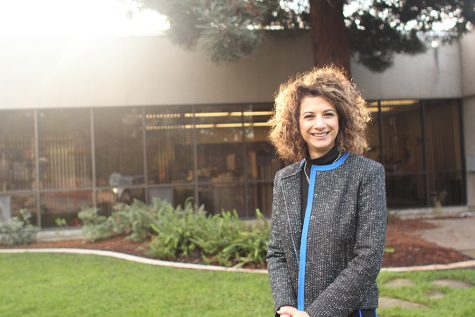‘Advocate’ cuts social, economic mires
Richmond, San Pablo native shares poignant political legacy, battle with cancer
Retired political science professor Leonard McNeil sits alongside a college sign on campus on March 7. McNeil reminisced of the time he and former CCC president McKinley Williams spent together “dragging the main”on McDonald Avenue and 23rd Street in Richmond as Richmond High School seniors and as students at Contra Costa College.
March 16, 2016
In broad daylight, the few African-American student activists who attended Cal State-Fresno in the spring of 1968 painted a table outside the cafeteria black in the wake of the assassination of Dr. Martin Luther King and increased racial tensions on campus.
For two consecutive mornings, the students returned to their table on campus where the African-American students congregated and had to repaint their symbol of solidarity to cover where the words “white power” were written overnight.
“Again, our symbol was desecrated with the term ‘white power’,” Leonard McNeil, 70, who retired from teaching political science at Contra Costa College this semester, said. “After the second time, two students, including myself, decided to go to the college President’s Office and paint his door black — it did not go over very well.”
McNeil and his fellow BSU officers were arrested for the misuse and abuse of state property, but he said their actions led to a meeting with former college president Fredrick Ness, faculty and students to create a Black Student Union and address issues in hiring practices and ease racial tensions in the community.
At the time there were only about 40 African-American students attending Fresno State out of an enrollment of about 11,000, he said.
Since then McNeil has continued to challenge racial and economic divides in society. He has done so through his political activism as a San Pablo City Council member and mayor, as an ironworker, a Vietnam War exile, an adviser for the nonprofit organization Black Alliance for Just Immigration, as current president of the West County Wastewater District Board and as a professor at the same college community that inspired his social justice work when he was a student at CCC in the mid-1960s.
McNeil said he received his master’s degree in political science from San Francisco State in 2012 while teaching political science courses on campus, working as a city council member and being a pillar for his family.
“He was the oldest person in his class graduating with a master’s degree,” Carmen McNeil, his daughter and psychology professor at Diablo Valley College, said. “So in that sense he has really been a model for me in terms of determination, integrity and being a person of his word.”
No challenge, however, can compare to what he and his support network of friends, students, activists and family must overcome now.
“I have stage four prostate cancer,” McNeil said. “At this point, I don’t know how long I’m going to live.”
He said he received the results from the diagnosis during Finals Week last semester, but he only told his family, close friends and people who would be directly affected by his condition.
“People bring me water and food. They text, call, visit and send me emails. They are there for me,” he said. “I have a very strong support network and I have a strong will to live and I will fight it the best I can.”
McNeil said he is using this time away from teaching to read, write books about his three grandchildren and spend time with his family and friends while undergoing chemotherapy.
“I’m dealing with the illness,” he said. “I look at every day as a gift. I know that this discomfort and miserable stuff I’m going through with chemotherapy won’t kill me — but this cancer will.”
“It was devastating news to hear, especially during Christmas,” Vanna Gonzales, CCC political science professor and Community Organizing for Political Action club adviser, said. “But at that time he didn’t want anyone to know.”
Gonzales said she was worried that he would be isolated during this challenging time, so she went to his home and found comfort in the strong support system she saw.
“He has great family support because he has given so much to support his family,” she said. “He also has connections as the mayor, on the water board and other networks, so he has positive voices to support him.”
McNeil said, “I’m a fighter and I’m going to keep on fighting like I always have.”
He said he is not afraid of death, but wants to know that he was able to help disenfranchised groups in the community and the people he loves to the best of his ability.
“Legacy is about living with purpose,” McNeil said. “But I wonder, what will people say about me? What will people say to help others who knew me grieve, especially my son, daughter and grandkids? What will people say?”
Leveling the slant
Since 2009, McNeil taught political science on campus until he stepped away from the position in December. His influence lingers in those who listened to his teachings.
Puja Dahal, a student who was in McNeil’s political science class while she was attending Middle College High School on campus in 2013, is now majoring in social welfare and global poverty at UC Berkeley.
“(McNeil) inspired me,” Dahal said. “Before I took his class I was never exposed to politics on a global scale.”
She said the most memorable class exercise was a mock debate in which he asked students to state which political party that they affiliate themselves with — either Democrat or Republican.
After he took a poll of the students, McNeil said he told them they would have to argue for the opposing political party.
“We had to pretend that we support policies that go against our values,” Dahal said. “We learned how both sides react and why. (McNeil) got us involved with politics more than we would have (been) through lecture.”
McNeil said he structured the exercise in a way that would not only strengthen students’ critical thinking skills by understanding the opposing point of view, but by allowing them to better understand their own.
“You have to take your own values, philosophy and perspective and counter them to opposing views to examine their merits and see if they hold up to reality,” he said. “I read what conservatives say all the time. I don’t believe most of it, but at least I know what they are saying so I can engage them in dialogue to find an answer.”
McNeil said he is grateful to former CCC president McKinley Williams for giving him the opportunity to share his experience in local politics and organized activism with a younger generation as an instructor.
“I think (McNeil) is a great example of a local kid doing well and coming back to the community to make the area better and not just in San Pablo politics, but at CCC,” Williams said. “He is a breath of fresh air for the public who value him as a politician and professor.”
“He has been a champion for those who do not have a voice. I appreciate knowing him as a friend back to when we both played football and basketball (at Richmond High School) together and (during) our reunion at the college,” Williams said.
Manu Ampim, CCC history professor, worked alongside McNeil and said his ability to relate to students and connect them to politics is “admirable.”
“I think that is one of the things that (McNeil) brought to the table, that ability to present political paradigms in a way that links the classroom and community so that students can see the relevance,” Ampim said.
Janelle Knudson, a psychology major, said she learned the value of politics while working on a final research paper in McNeil’s class about how the private prison industry targets minority groups.
“He guided me every step of the way,” Knudson said. “He is an advocate. As a teacher he was dedicated to showing students how policies affect them and how they are financially backed. The system is set up for the rich to succeed and he explained we would have to work harder to get where we want in life.”
McNeil said it was a difficult decision to step away from teaching. But he said it was a better choice than trying to keep teaching though the chemotherapy and not being able to meet the rigorous requirements that come with being a professor.
“I miss teaching,” he said. “It is, and has been, such a big part of my life — it gave me structure,” he said. “I may not have a doctorate but I felt just as capable in teaching after 47 years of being a social change activist — I wouldn’t trade it for anything.
“It was an honor and humbling experience to share my convictions and commitment to democratic justice and equality. So yes — I will miss teaching political science because the students were the reason why I was there.”
Championing human rights
McNeil said racial tensions at Cal State-Fresno were spurred by a football coach’s comment blaming McNeil and other black players for a 3-8 season.
“Like most places at that time, it was reasonably hostile if you were black. So (McNeil) and others were trying to advance the role of the civil rights movement in a not so friendly place,” John Stewart, former English professor at Cal State-Fresno, said. “There were confrontations between black students and a white administration.”
Stewart said McNeil was outraged about this racist accusation and their actions helped organize students and faculty to form the third Black Student Union at a university in the state.
He said because of demonstrations by McNeil and other officers in the BSU, campus administration agreed to add courses that focused on black culture, hire more black professors and allow the BSU to host events that celebrated black history in America.
But McNeil said his time at Fresno and his opportunity to play with the Philadelphia Eagles were cut short because of his student activism against racism with the BSU and his opposition to the Vietnam War draft — which forced him to flee to Vancouver, Canada.
“Some people just went (to the Vietnam War) because they felt like they had no other choice,” McNeil said. “I was (drafted) at the time, but I didn’t want to kill anyone. So all I could do was run, go to jail or commit suicide — those were my choices.”
McNeil said he met other Vietnam War dissenters at the University of British Colombia.
“Unlike a lot of draft resisters, we continued our activism in Canada by creating the Vancouver Black Action Group, a black action group that was active on and off campus,” fellow activist Mark Allen said. “We held protests against the Vietnam War and opposed British and Canadian imperialism in the Caribbean.”
Allen said he could not imagine what exile in Canada would have been like without meeting a “kindred spirit” who stands up for human rights.
Allen said, “(McNeil) was always passionate about learning and engaging in discussions that mattered. He was never intimidated to ask a question or intimidated about the answer.”
Upon returning to the U.S. in 1970, McNeil and Allen were politically active during the Angela Davis and Soledad brothers protests, until they were both charged with federal offenses for refusing induction into the U.S. military and failure to inform the Selective Services system of their current addresses.
McNeil said they had both charges dropped on technicalities, but he had a different mindset while he stood in front of an all-white jury than before he fled to Canada.
“At the time I left to Canada I was not prepared to go to jail. Why should I have to go if I refuse to kill other human beings?” he said. “But when I got older I was prepared to make that sacrifice because what would happen to me in jail was nothing compared to what was happening to the Vietnamese people.”
He said his experience as a Vietnam War resistor in Canada gave him an international perspective on immigration and the economic and racial constructs that push people to escape.
McNeil said this helped inspire his nonprofit involvement with Peace and Justice Youth Outreach Project, an American Friends Service Committee program focused on conscientious objection to military recruitment in high schools, in Oakland for nine years.
Opal Tometi, executive director of the Black Alliance for Just Immigration, said McNeil is a member of the steering committee and has been a “leader at community events and fundraisers. He has been with us since the beginning (2006).”
Tometi said McNeil has been pivotal in helping establish a West Coast BAJI branch through his public speaking and participation in community activities and protests.
McNeil said that as a board member in BAJI, and in his political science class, he explains that social, economic and political forces, and economic policies of the U.S., are major factors in people coming to the country.
He said the largest groups of people coming into the U.S. from Mexico and South America are refugees escaping poverty and a war waged by drug cartels, but the way in which corporate media outlets distort the impact immigration has on the U.S. economy and culture has not changed since he was in exile in opposition to the Vietnam War.
“It’s just the 2016 version of economic exploitation and oppression of scapegoating undocumented people for the bad economy that takes jobs away from so called ‘real Americans’,” McNeil said. “People who are undocumented are not responsible for the chronic disproportioned unemployment rates, not for most of the manual jobs going to workers in low-wage countries without unions or regulations. These people are not responsible for any of that.”
“I think that when people do not understand those particular forces they look to other constituencies to blame for their problems,” he said. “I think that people in America are being manipulated by people like Republican candidate Donald Trump in that way. Xenophobia becomes a factor for dividing working people from one another. It is displaced anger and fear of losing power as the dominant culture.”
After dodging a sentence at a federal prison, McNeil said he earned a vocational education credential from UC Berkeley, completed a union apprenticeship program at Merritt College in Oakland and worked from 1974 until he retired in 1988 as part of the Ironworkers Local Union 378.
Guiliana Milanese, community activist and wife of McNeil’s best friend — the late Filipino housing rights activist Bill Sorrow — said McNeil worked with Sorrow within the ironworkers union to bring an end to economic exploitation of immigrant workers and discriminatory practices.
McNeil said he used the socialist model that he was exposed to while visiting Cuba in 1947 and 1984 to promote unity among a diverse workforce for fair working conditions.
“The bosses and working conditions were brutal,” Milanese said. “My husband (Sorrow) had a really bad accident and I was scared for him to go back to work, not only because the harsh conditions of the work but because he was racially stereotyped as well.”
She said McNeil and Sorrow worked together in the community to bring people of all colors together under a common creed.
“What they did within the ironworkers union was amazing,” she said. “They did not divide but brought people together and made them realize they have more in common with one another than they do with the boss — and that is the last thing the boss wants.”
Tearing apart municipal mire
McNeil is known as a conduit for social justice mainly through his 12-year experience as a San Pablo City Council member and as the city’s first male African-American mayor in 1991, and during his second term in 2008.
Now McNeil is the president of the West (Contra Costa) County Wastewater District Board.
He said he ran for the position in 2014 because of racist comments made by 85-year-old Leonard Battaglia, who had been on the board for 30 years, and a general sense of complacency on the board in the wake of those comments.
“There were five men on the board. These were all men who had been entrenched on board for 29 or 30 years, so there was no diversity there,” McNeil said.
He said Battaglia’s comment that appeared in the West County Times, paraphrased, was that African-Americans think slow, but it’s not their fault, it is just how God made them.
McNeil recruited Richmond activist Audrey Comeaux to run alongside him in order to bring her 23 years of experience working with wastewater data and systems, and a progressive force, to the board.
“(Comeaux) is first woman to get elected to the wastewater district since 1921,” McNeil said.
Comeaux said, “There was not any diversity on the wastewater board at the time — none at all. It did not have a female member for close to 100 years and at the time was made up of five white males, four of whom had been in position since late 1980s.”
McNeil said special municipal districts play a vital role in local politics and community welfare but their influences go largely unnoticed.
Currently, the board is implementing a $570 million project that will upgrade wastewater treatment plants and underground infrastructure in the district’s service area that is made up of San Pablo, Richmond, El Sobrante, Tara Hills, North Richmond and southern parts of Pinole.
Comeaux said she is looking forward to continuing working with McNeil to make sure the wastewater district is working to help low-income communities and not working against them.
“(McNeil) is a people person,” Comeaux said. “He gets along very well with people and is a very calming and intelligent man whom I admire.”
McNeil’s social justice work before tackling his latest challenge on the wastewater board was just as poignant in bridging economic and health issues for marginalized minority groups.
San Pablo City Manager Matt Rodriguez, who was hired by him, said McNeil was a council member from 1988 to 1992 and from 2004 to 2012.
“(McNeil) is a striking figure of a man — he is very tall,” Rodriguez said. “He is patient and knowledgeable and I found him very good to work with on any issue, activity or program that the city contemplated bringing forward.”
Rodriguez said McNeil was influential in trying to provide free Internet access to all San Pablo residents who are unable to afford paying service providers, and implementing programs to better relations between the police department and at risk youth using 2012 Measure Q funds.
McNeil said during his terms as a city council member he is most proud of his involvement in creating various affordable housing programs, the push for all people to have free Internet and playing a role in the creation of San Pablo Economic Development Corporation using funds from Measure Q.
Former San Pablo Mayor Kathy Chao Rothberg, the first Mien mayor in the nation, said at the time, the council was looking to implement programs using the sales tax initiative that would train people in the community on necessary skills in today’s workforce.
The result was SPEDC, a nonprofit group that works with the community to promote building a workforce through providing access to training, creating public-private partnerships and linking the community to resources, she said.
Rodriguez said McNeil’s influence within the San Pablo City Council helped develop many progressive programs, like SPEDC, that still help economically disadvantaged people succeed in the workforce.
“(McNeil) was one member of a five-member council so the entire city council should be acknowledged for its achievements,” Rodriguez said. “But he is a leader with vision who championed for more community outreach programs and transparency in government.
“A lot of similar programs were created as a result of his leadership,” he said. “(McNeil’s) legacy is in creating emphatic transparency and civil engagement for the city.”
Rothberg, who currently sits on the San Pablo City Council, said, “(McNeil) was the first on the council to push to widen the youth’s accessibility to technology in our city.
“He did this to promote education attainment in the community and mitigate access to education and economic development,” she said. “The council is now looking at providing fiber optics for residents and businesses in the city, which is something (McNeil) started.
“(McNeil) has been a leader in pushing people toward apprenticeship avenues to rise into the middle class by providing social services to a community in need.”
As mayor in 2008, McNeil started the Childhood Obesity Taskforce that helped San Pablo earn an All-American City award from the National Civic League in 2014, Rodriguez said.
A 2010 Childhood Obesity Report by the California Center for Public Health Advocacy showed that San Pablo has the highest percentage of children who are overweight in the county.
Out of the 15 cities within Contra Costa County, San Pablo childhood obesity is at 52 percent, while cities like Walnut Creek, Lafayette and Danville have 21, 18 and 16 percent of their children considered obese, respectively.
CCC health education professor Jim Grizzel said cities that have high concentrations of fast food restaurants and liquor stores compared to grocery stores and parks, and less access to information about healthy living, are called “food deserts.”
And according to the U.S. Census Bureau, out of the 29,100 residents in San Pablo, 28 percent were 18 years old or under.
McNeil said while he was mayor in 2008, he addressed the high obesity rate in San Pablo by creating an ad-hoc committee focused on developing programs to inform people of healthy living options despite living in a “food desert.”
“This is a life or death issue. A person’s zip code is a major factor in how long they live and what illnesses they could be susceptible to,” McNeil said. “And since San Pablo has a significantly large Latino and African-American population, these are the people who are most affected.”
Wrecking racism, teaching diversity
“History provides context. There are no neutrals in war,” McNeil said. “Politics is about power — it’s about who gets what, when, why, how and who pays.”
Rodriguez said before McNeil was elected to the city council in 1988, the board was filled with white council members who did not represent San Pablo’s growing Latino, Asian and substantial African-American communities.
Rothberg said McNeil is her mentor who inspired her, and other council members, to become involved in local politics. “(McNeil) was instrumental in my decision to run for office and in bringing diversity to the (city council).”
Since the 1950s, according to the U.S. Census Bureau, San Pablo’s white population has drastically declined. The city’s white population dropped from 93 percent to 32 percent by 2010. In 1990, a year before McNeil was elected as mayor, the white population was 49 percent, African-Americans made up 21 percent, Asians 17 percent and Latinos 25 percent.
But even then, McNeil said, San Pablo was racially divided and was considered the “Mississippi of the West.” He said some of his close friends told him that if he planned on running for political office he better buy a bulletproof vest.
“Historically, the city (of San Pablo) is not that old,” Rothberg said. “It was incorporated in 1948. So up until (McNeil), the (city council) was pretty much 100 percent Caucasian.”
McNeil said people who challenge conventional wisdom in terms of justice and equality through the democratic processes face resistance.
“You need fortitude and vision to withstand the headwinds,” he said. “I think that just comes with being an activist no matter what gender, race or ethnicity.”
The mires within mainstream American society, however, are dependent on people defining others based on these categories.
McNeil said his family moved from North Richmond to San Pablo in 1956 when he was 10 years old — eight years before the Civil Rights Act racially desegregated schools.
He said it was not until he moved, or whenever he left the predominately African-American community of North Richmond, that he, his three brothers and friends were subjected to racial slurs or attacks.
“Some things you just didn’t do,” McNeil said. “You could not be walking around by yourself at certain times of the day in San Pablo or Richmond. It was risky because no one person was going to run up on you try to fight you or take what have you — it was always five or six.”
While he said that there were few racial confrontations while he was a student at Riverside Elementary School, Helms Middle School and CCC (1963 to 1967), “most of the tensions spilled over into the community and violence between whites and blacks happened in high school and the larger community.”
He said because the Hilltop Mall area “was a bunch of dirt, big tanks filled with gas and farms,” most Fridays and Saturdays as a teenager were spent “draggin’ the main” on Macdonald Avenue and 23rd Street.
Williams said, Draggin’ the main was the thing to do on weekends because there were no businesses in Hilltop — but man, it was lit up from 1st Street all the way to 23rd (along Macdonald Avenue).”
McNeil said that while it was mostly a fun experience, there were certain places you could not go to if you were African-American. Williams said, “Anything past 24th street going East on McDonald was off limits if you were black.”
McNeil said, “Men and women would get dressed up and waste gas driving down the street slowly, go to the movies or go grab a bite to eat. But if you were African-American and you went to Doggie Diner on 23rd (Street) and Macdonald (Avenue), you were going to get jumped on. That was not a place you could go and get a hot dog and fries alone.”
Williams said while it was a racist fast food establishment because he and McNeil had teammates on the Richmond High School football, basketball and baseball teams who were let in a once or twice, but “you immediately felt unwelcome and didn’t want to go back.”
Williams said racial tensions in the community were a lot worse in the 1950s when he and McNeil were still in middle school.
Both Williams and McNeil recall their fathers going into the Rollingwood area just south of the CCC campus to protect their friend’s families. This community was almost completely white and African-American families who moved in there were labeled as “block busters.”
“I remember getting a call from my friend Thomas Gary late at night,” Williams said. “Me and my father rushed over and some people had burned a cross on his lawn. It was the terror of the times.”
McNeil said while there was not much racial diversity while he was a student at CCC the racial hatred surrounding the college did not permeate onto campus because there were not a lot African-Americans enrolled at the time.
He said when he and other football players transferred to Cal State-Fresno is when he saw just how divided the country was.
“We were leaving friends, we were leaving the communities that we knew. We were leaving a cultural base that is the Bay Area for a much more hostile environment filled with violence and constant and typical racial slurs. It was a shock — I was called a nigger habitually and typically.”
And while he professed he was not politically active until he left CCC, and that he only attended one meeting where attendees talked about starting up a Black Student Union on campus, it was in the Library and Learning Resource Center where the seeds of activism were sewn into his young mind.
“I began studying the African-American experience in America, particularly in the Library at CCC,” McNeil said. “James Baldwin, Ralph Ellison and Richard Wright — I was exposed to all three in a course at CCC in English 116, which was considered ‘bonehead’ English back then.
“But I kept reading about the war in Vietnam. I learned that African-American soldiers were dying in disproportionate numbers,” he said. “I learned about the different wars the U.S. had been in and I learned most wars were rich man’s wars and a poor man’s fight.”
McNeil said that while racial tensions that spurred such hate are no longer prevalent in most people’s minds, there is still de facto, or underlying, racism in many facets of American society.
“Things are worse now in some respects than they were back in the day,” he said. “You didn’t hear the term environmental racism, which has to do with carcinogens from factories in low-income communities. Now Latinos and low-income whites are subjected to the same inequalities African-Americans went through.”
McNeil said, “Politicians like Bernie Sanders who are talking about economic justice are talking about the unfinished business of the civil rights movement.”
He said he wants to help the youth learn about a political system that has the capability to marginalize people, yet unite them under the idea of economic and social justice despite their differences.
“I want to help people learn about our system,” he said. “I am using and have used my own experience, which led me to teaching politics, as a tool. It’s not based on opinion — people are discriminated against in terms of class, race, gender and ethnicity. These issues are local, national and international issues. And I can speak on these issues from a level of credibility because I’ve lived them all.”


